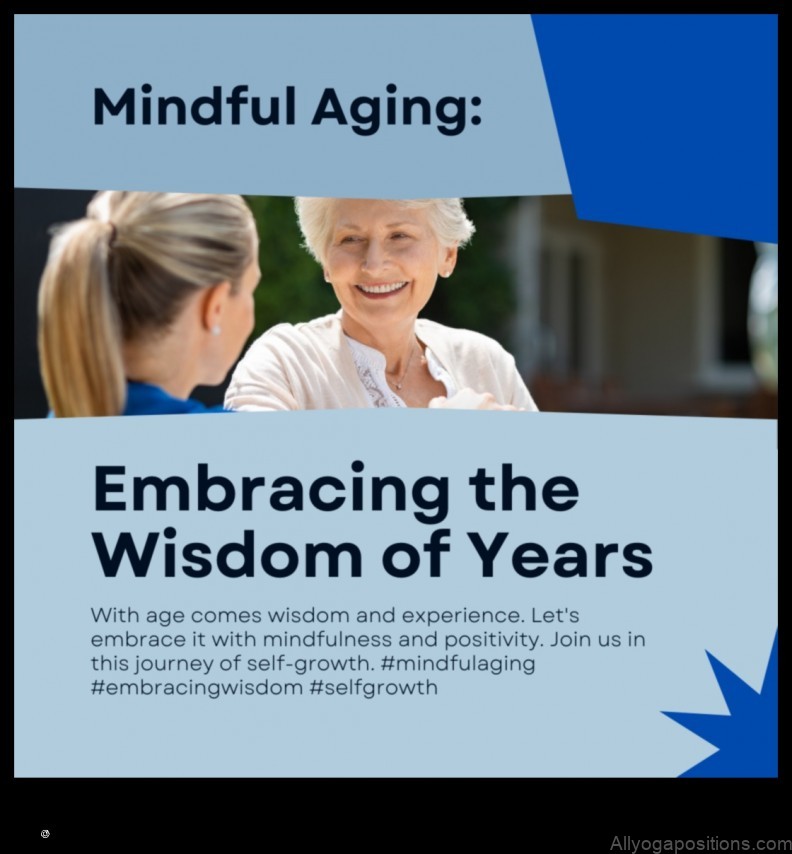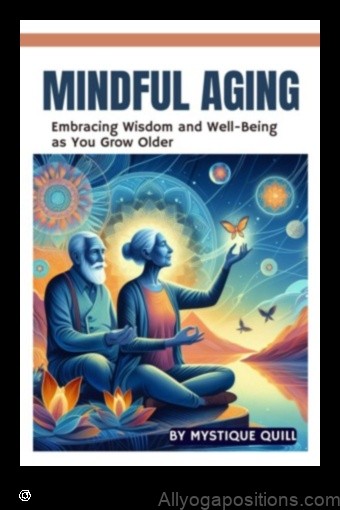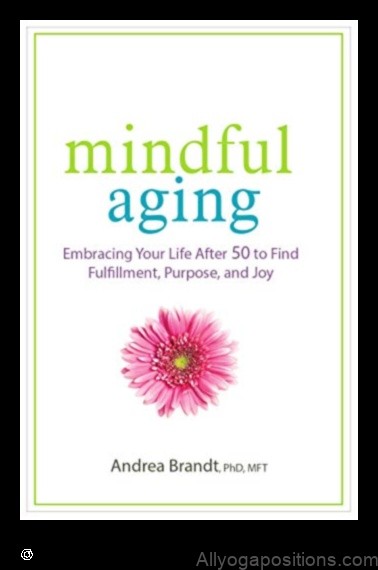
Meditation and Mindful Aging: Embracing the Wisdom of Years
Mindfulness and aging are two important topics that are increasingly being discussed together. As people live longer and healthier lives, they are looking for ways to stay mentally and physically fit as they age. Mindfulness meditation is one practice that has been shown to have a number of benefits for older adults, including reducing stress, improving sleep, managing pain, and boosting cognitive function.
In this article, we will explore the benefits of mindfulness meditation for older adults and provide tips on how to get started with this practice. We will also discuss some of the challenges that older adults may face when practicing mindfulness meditation and offer suggestions for how to overcome these challenges.
## Benefits of Mindfulness Meditation for Older Adults
There are a number of benefits of mindfulness meditation for older adults, including:
- Reduced stress
- Improved sleep
- Manage pain
- Boost cognitive function
- Reduced risk of depression and anxiety
- Increased sense of well-being
## How to Get Started with Mindfulness Meditation
If you are new to mindfulness meditation, there are a few things you can do to get started:
- Find a quiet place where you can practice without distractions.
- Sit in a comfortable position with your spine straight.
- Close your eyes and focus on your breath.
- Bring your attention to the present moment, noticing your thoughts and feelings without judgment.
- Continue to practice for 5-10 minutes, gradually increasing the length of your practice as you become more comfortable.
## Challenges of Mindfulness Meditation for Older Adults
There are a few challenges that older adults may face when practicing mindfulness meditation, including:
- Physical limitations
- Cognitive decline
- Lack of motivation
If you are facing any of these challenges, there are a few things you can do to overcome them:
- Adapt your practice to your physical limitations. For example, you can sit in a chair or lie down if it is more comfortable for you.
- Use simple mindfulness exercises that are appropriate for your cognitive abilities.
- Find a supportive community of people who are also practicing mindfulness meditation.
## Conclusion
Mindfulness meditation is a powerful practice that can have a number of benefits for older adults. By practicing mindfulness meditation, you can reduce stress, improve sleep, manage pain, boost cognitive function, and reduce your risk of depression and anxiety. If you are new to mindfulness meditation, there are a few things you can do to get started. Find a quiet place where you can practice without distractions, sit in a comfortable position with your spine straight, close your eyes and focus on your breath, and bring your attention to the present moment, noticing your thoughts and feelings without judgment. Continue to practice for 5-10 minutes, gradually increasing the length of your practice as you become more comfortable. If you are facing any challenges, there are a few things you can do to overcome them. Adapt your practice to your physical limitations, use simple mindfulness exercises that are appropriate for your cognitive abilities, and find a supportive community of people who are also practicing mindfulness meditation.
| Feature | Description |
|---|---|
| Aging | The process of growing older, which is characterized by physical, mental, and social changes. |
| Mindfulness | A state of awareness in which one is attentive to and aware of their thoughts, feelings, and bodily sensations, without judgment. |
| Meditation | A practice that involves training the mind to focus on a particular object or thought, in order to achieve a state of mental clarity and relaxation. |
| Wisdom | The ability to make good judgments and decisions, based on experience and knowledge. |
| Well-being | A state of physical, mental, and social well-being. |

1. Mindfulness and Aging: An Introduction
Mindfulness is the practice of paying attention to the present moment, without judgment. It is a way of being aware of our thoughts, feelings, and bodily sensations, without getting caught up in them. Mindfulness can be practiced through meditation, yoga, or other activities that help us to focus on the present moment.
Aging is a natural process that involves both physical and mental changes. As we age, our bodies may slow down, our minds may become less sharp, and we may experience a variety of health problems. However, aging can also be a time of growth and wisdom. With mindfulness, we can learn to accept the changes that come with aging and live our lives to the fullest.
Mindfulness can help older adults in a number of ways. It can reduce stress, improve sleep, manage pain, and boost mood. It can also help us to connect with others and find meaning in our lives.
If you are an older adult, I encourage you to try mindfulness meditation. It is a simple practice that can have a profound impact on your life.
3. How to Practice Mindfulness for Older Adults
Mindfulness is a practice that can be learned and cultivated at any age. However, there are some specific things that older adults can do to make the most of their mindfulness practice.
Here are a few tips:
- Start by setting aside a time each day to practice mindfulness. This could be just a few minutes, or it could be longer. The important thing is to make it a regular part of your routine.
- Find a comfortable place to practice mindfulness. This could be your own bed, a chair, or even a park bench.
- Close your eyes and focus on your breath. Notice the feeling of the air as it flows in and out of your lungs.
- As thoughts come into your mind, let them go. Don’t try to control them or push them away. Just notice them and let them pass.
- Stay present in the moment. Notice the sights, sounds, and smells around you. Feel the ground beneath your feet and the air on your skin.
- Be kind to yourself. Mindfulness is a practice, and it takes time to get good at it. Don’t get discouraged if you have trouble concentrating or if your mind wanders. Just keep practicing and you will gradually get better at it.
Mindfulness can be a powerful tool for older adults. It can help to reduce stress, improve sleep, manage pain, and promote overall well-being. By practicing mindfulness, older adults can live healthier, happier, and more fulfilling lives.

4. Mindfulness and Stress Reduction in Older Adults
Stress is a common experience for older adults, and it can have a significant impact on their physical and mental health. Mindfulness-based stress reduction (MBSR) is a type of meditation that has been shown to be effective in reducing stress in older adults. MBSR teaches people how to pay attention to their thoughts and feelings without judgment, and to let go of negative thoughts and emotions. This can help to reduce stress levels and improve overall well-being.
A study published in the journal Psychosomatic Medicine found that MBSR reduced stress levels in older adults with chronic pain. Participants in the study who completed an eight-week MBSR course reported lower levels of stress, anxiety, and depression, and improved sleep quality. They also reported feeling more in control of their pain and more optimistic about their future.
Another study, published in the journal The Gerontologist, found that MBSR reduced stress levels in older adults who were caring for a spouse with dementia. Participants in the study who completed an eight-week MBSR course reported lower levels of stress, anxiety, and depression, and improved sleep quality. They also reported feeling more positive about their lives and more hopeful about the future.
These studies suggest that MBSR can be an effective way to reduce stress in older adults. If you are an older adult who is struggling with stress, MBSR may be a helpful option for you.
5. Mindfulness and Sleep in Older AdultsMindfulness practices have been shown to improve sleep quality in older adults. A 2015 study found that mindfulness meditation reduced sleep latency (the time it takes to fall asleep) and improved sleep quality in older adults with insomnia. Another study found that mindfulness-based stress reduction (MBSR) reduced sleep disturbances in older adults with chronic pain.
Mindfulness practices may help improve sleep quality in older adults by reducing stress, anxiety, and pain. Mindfulness can also help people to develop healthier sleep habits, such as going to bed and waking up at the same time each day and creating a relaxing bedtime routine.
If you are an older adult who is struggling with sleep, mindfulness practices may be a helpful way to improve your sleep quality. Talk to your doctor or a mental health professional about mindfulness-based interventions that may be right for you.
6. Mindfulness and Pain Management in Older Adults
Pain is a common problem for older adults, and it can have a significant impact on their quality of life. Mindfulness can be a helpful tool for managing pain in older adults, as it can help them to reduce stress and anxiety, which can both contribute to pain. Mindfulness can also help older adults to develop coping mechanisms for dealing with pain, and to improve their overall sense of well-being.
There are a number of ways that older adults can incorporate mindfulness into their lives to help manage pain. One way is to practice mindfulness meditation, which involves sitting in a comfortable position and focusing on the breath. Another way is to practice mindfulness-based stress reduction (MBSR), which is a program that teaches participants how to use mindfulness to manage stress and pain.
Research has shown that mindfulness can be effective in reducing pain in older adults. A study published in the journal Pain found that mindfulness meditation reduced pain intensity, pain-related anxiety, and pain-related depression in older adults with chronic pain. Another study, published in the journal JAMA Internal Medicine, found that MBSR reduced pain intensity and pain-related disability in older adults with chronic pain.
If you are an older adult who is struggling with pain, mindfulness may be a helpful tool for you to consider. Talk to your doctor about whether mindfulness meditation or MBSR might be right for you.
7. Mindfulness and Cognitive Decline in Older Adults
As people age, it is common for them to experience some degree of cognitive decline. This can include problems with memory, attention, and decision-making. Mindfulness meditation has been shown to be helpful in reducing the symptoms of cognitive decline in older adults.
One study found that mindfulness meditation was associated with improved memory, attention, and executive function in older adults with mild cognitive impairment. Another study found that mindfulness meditation was associated with reduced risk of developing dementia in older adults.
The mechanisms by which mindfulness meditation may help to reduce cognitive decline in older adults are not fully understood. However, it is thought that mindfulness meditation may help to improve cognitive function by reducing stress, anxiety, and inflammation. Mindfulness meditation may also help to strengthen the brain’s neural networks and promote new learning.
If you are an older adult who is concerned about cognitive decline, mindfulness meditation may be a helpful way to improve your cognitive function and reduce your risk of developing dementia.
Mindfulness and Depression in Older Adults
8. Mindfulness and Depression in Older Adults
Depression is a common mental health problem that can affect people of all ages, including older adults. The symptoms of depression can include feeling sad, hopeless, or worthless; having low energy; difficulty concentrating; and changes in sleep or appetite. Depression can also lead to social isolation and withdrawal.
Mindfulness is a type of meditation that has been shown to be effective in reducing symptoms of depression in older adults. Mindfulness involves paying attention to the present moment, without judgment or criticism. This can help older adults to become more aware of their thoughts and feelings, and to learn how to manage them in a healthy way.
A number of studies have shown that mindfulness can help to reduce symptoms of depression in older adults. One study, which was published in the Journal of the American Geriatrics Society, found that mindfulness-based stress reduction (MBSR) was effective in reducing depression in older adults with chronic pain.
Another study, which was published in the journal Mindfulness, found that mindfulness-based cognitive therapy (MBCT) was effective in reducing depression in older adults who were at high risk for suicide.
If you are an older adult who is struggling with depression, mindfulness may be a helpful treatment option for you. Mindfulness can help you to learn how to manage your thoughts and feelings in a healthy way, and it can help you to reduce your symptoms of depression.
If you are interested in learning more about mindfulness, there are a number of resources available to you. You can find books, articles, and online courses on mindfulness. You can also find mindfulness classes in your local community.
If you are struggling with depression, it is important to seek professional help. A therapist can help you to identify the causes of your depression and develop coping mechanisms.
9. Mindfulness and Anxiety in Older Adults
Anxiety is a common experience for older adults, and it can have a significant impact on their physical and mental health. Mindfulness-based interventions have been shown to be effective in reducing anxiety in older adults, and they may also help to improve cognitive function and well-being.
Mindfulness-based interventions teach people how to pay attention to their thoughts and feelings without judgment, and to let go of negative thoughts and emotions. This can help to reduce anxiety by allowing people to better manage their stress levels and to see their problems from a more objective perspective.
There are a number of different mindfulness-based interventions that can be used to treat anxiety in older adults, including:
- Mindfulness-based stress reduction (MBSR)
- Mindfulness-based cognitive therapy (MBCT)
- Acceptance and commitment therapy (ACT)
These interventions typically involve weekly group sessions over a period of eight to twelve weeks. During the sessions, participants learn mindfulness meditation techniques, such as breathing exercises and body scans. They also learn how to apply mindfulness to their everyday lives, such as by paying attention to their thoughts and feelings without judgment, and by letting go of negative thoughts and emotions.
Mindfulness-based interventions have been shown to be effective in reducing anxiety in older adults, and they may also help to improve cognitive function and well-being. If you are an older adult who is struggling with anxiety, you may want to talk to your doctor about whether a mindfulness-based intervention might be right for you.
10. FAQ About Mindfulness and Aging
Q: What is mindfulness?
A: Mindfulness is the practice of paying attention to the present moment, without judgment. It is a way of being aware of our thoughts, feelings, and bodily sensations, and of our interactions with the world around us.
Q: What are the benefits of mindfulness for older adults?
A: Mindfulness has been shown to have a number of benefits for older adults, including reducing stress, improving sleep, managing pain, and reducing the risk of cognitive decline.
Q: How can I practice mindfulness?
A: There are many ways to practice mindfulness, including meditation, yoga, and tai chi. You can also practice mindfulness in everyday activities, such as eating, walking, or taking a shower.
Table of Contents
Maybe You Like Them Too
- Yoga for Emotional Balance Detox Your Body and Mind
- Yoga for Emotional Wellness 5 Poses to Cultivate Patience
- Yoga for Emotional Balance Find Nourishment for Your Mind, Body, and Soul
- Yoga for Back Pain 10 Poses to Help Relieve Discomfort
- Journey to Serenity The Art of MeditationA Guide to Finding Peace and Tranquility in a Chaotic World
